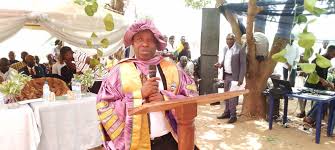By Adewale Kupoluyi
As Nigeria continues to battle with the challenge of unemployment, hunger and poverty, among others, new insights have been unfolded on the way to go in ensuring food security in the nation. Food security can be established with the right focus on agriculture because of its capacity and capability to bail the country out of many of its problems. While a Professor of Ruminant Nutrition and Forage Science in the Department of Pasture and Range Management (PRM), College of Animal Science and Livestock Production (COLANIM), Federal University of Agriculture, Abeokuta (FUNAAB), Ogun State, Professor Oluwasanmi Arigbede, has called for an allinclusive and adoptable research for the good of the society, Dr. Samson Odedina; the Provost, Federal College of Agriculture, Akure, Ondo State, has disclosed that Nigeria remains an untapped potential agricultural power house that can boost the country’s economy. Discussing some of his research fi ndings, Professor Arigbede, who also doubles as the Director, Centre for Innovation and Strategy in Learning and Teaching (CISLT) of the University, said that it had been observed over the years that, there was always lack of adequate feeds; in quality and quantity for farmers to feed their ruminant animals during dry seasons.
Th is quest has brought about his involvement with various researchers and research institutes that had brought about initiatives such as the Forage-based Pellets and the Forage-based Feed Blocks, which are presently being fed to the West African dwarf rams, for adaptability. According to him, over the years, they had worked with the foliage.
As a means of helping poor farmers, Professor Arigbede said that he was committed to achieving his aim by working on Multipurpose Tree Speeches, and looking forward to commercialising the products, as the research had metamorphosed, through the various stages, from forage conservation to value addition, to conserved forages, which was aimed at preserving, not only the forage and seeds, but also preserve its quality, so that the feeds could be made to last longer and farmers would not be under any pressure to give them as feed to animals. Professor Arigbede said the Forage-based Feed Blocks had been tested and the animals were performing well on it while the Forage-based Pellets had just been introduced, saying “Th e joy of the feed pellet is that, they have a very good weight, preserved longer and high acceptability to ruminant animal”.
He promised that they (researchers) were already looking into food pellets and their various forms, to know the best combination that animals would most likely get well adaptable to, so that they can mass-produce and package in various retail weights for sale to farmers. On the nation’s agricultural policy, Professor Arigbede frowned at the poor implementation approach adopted by the government, which he said was the bane of Nigeria’s drive towards achieving food security and national development.
He also narrowed down to the issue of the Grazing Reserves Bill, being debated in the National Assembly, in which he enjoined the legislators to be patriotic in handling the bill. On herdsmen attacks, he said that they (herdsmen) had a long history with some of the people by co-habiting peacefully with them. He, however, queried why there was killing in some parts of the country only? And why are herdsmen the culprits?
Th e Don stressed the need to ascertain, if truly the perpetrators were Fulani herdsmen from Nigeria or not. On his part, Dr. Samson Odedina, in the lecture he delivered recently at FUNAAB titled, “Agricultural Value Chain Job Opportunities: Success Stories Among Youths in Nigeria”, observed that with a vast 84 million hectares of arable land, 279 billion cubic meters of surface water and an estimated current population of 165 million people that is projected to reach 470 million by 2050, Nigeria has been described as an untapped potential agricultural power house.
Just like Professor Arigbede, he said government policies should not be poorly implemented, in order to achieve sustainable agriculture practice in the country, warning that import dependency was hurting Nigerian farmers. Commenting on the targets for agricultural transformation in the country, he said 3.5 million jobs could be created within agricultural value chains, while describing value chains as full range of activities, which were required to bring a product or service from conception, through diff erent phases of its production.
He disclosed the huge opportunities were inherent in some agricultural products such as cassava in terms of stem production, weed control, root production, bulking agency, transport services, primary processing, value addition and product development like starch, fl our, confectioneries, bread, glue, beer as well as marketing. In conclusion, from the main recommendations made by the two researchers, the country needs to invest more in agriculture, put in place favourable policies and programmes, depend less on imported goods at the detriment of local production, encourage youth farming, engage in allinclusive and adoptable research, handle the issue of herdsmen attacks with more caution and practice eff ective pasture management. It is only hoped that those concerned would fi nd these suggestions useful in bailing the nation out of its current challenges by promoting food security. And my wishes, too!



